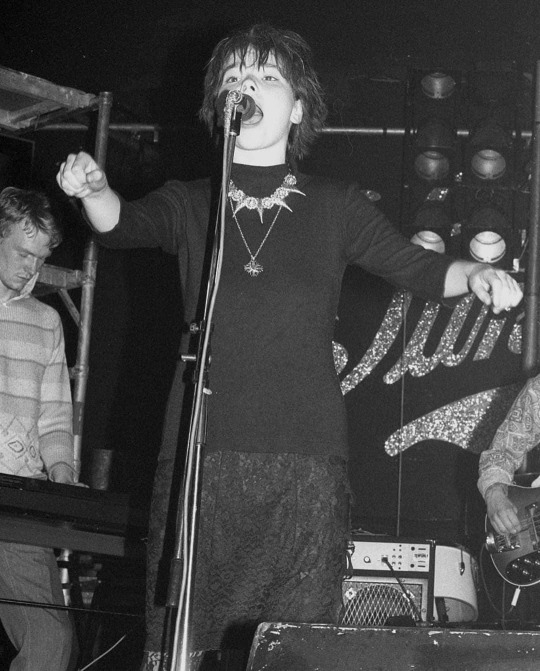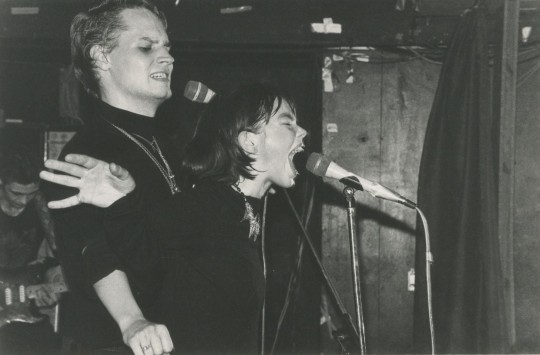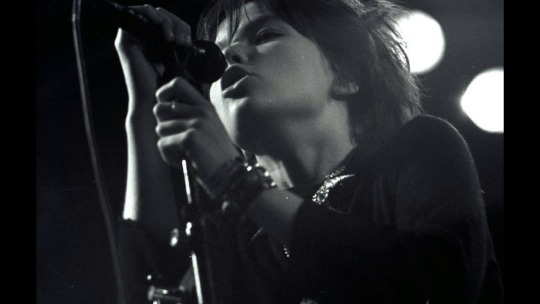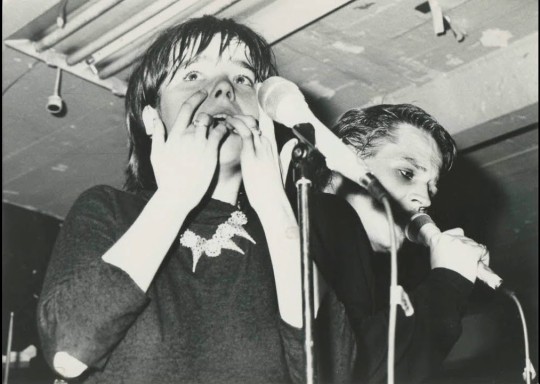#KUKL 1984
Explore tagged Tumblr posts
Text




"OUR NOURISHMENT. ATROCITIES OF THE WORLD..."
PIC INFO: Spotlight on Icelandic post-punk/(A)narcho/experimental band KUKL, with Björk at the forefront, performing in Manchester, England, with CHUMBAWUMBA (supporting), c. 1984.
"Through the Ugliness Of mankind We try to shine. Against stupidity Of mankind We try to fight. As our wages We get the lunacy Of others.
Our nourishment. Atrocities of the world. Our nourishment, Joy of the world."
-- K.U.K.L., "The Eye," c. 1984, CD liner notes
Source: http://gudmundsdottirbjork.blogspot.com/2014/07/kukl-live-manchester-england-uk-with.html.
#KUKL band#K.U.K.L.#Icelandic post-punk#Experimental#Punk girls#Manchester UK#Manchester#Experimental Music#80s girls#Punk gigs#Crass Records#Anarcho#Anarcho punk#Welcome to 1984#Björk#Björk Guðmundsdóttir#1984#80s punk#Icelandic Music#Post-punk#Icelandic#Punk photography#Experimental music#KUKL#Live gigs#Ladies of the 80s#Punk Style#80s#1980s#KUKL 1984
13 notes
·
View notes
Photo

KUKL
Stockton Road Bunker 28 08 1984
69 notes
·
View notes
Text
Strawberry Switchblade: 1982 4-Piece Demo
The story of Strawberry Switchblade is a reminder of just how small the alternative music scene was in the early 1980s, and how deeply its subcultures intertwined. Formed in 1980 in Glasgow by Jill Bryson and Rose McDowall, the pair’s eye-catching look—gothic Geisha in polka dot dresses and black lace gloves—set them apart from their immediate peers, the buttoned-up young men of the Postcard Records scene. Their early live performances caught the attention of John Peel, for whom they recorded a BBC session. But with renegade A&R man Bill Drummond—later to form pop terrorists the KLF—installed as the group’s manager, Strawberry Switchblade turned to face the mainstream.
Their 1984 single “Since Yesterday” was a breezily nostalgic electronic pop song that McDowall later claimed was about nuclear war. It broached the UK Top 10, propelled the duo onto the cover of Smash Hits, and made them officially big in Japan—screaming fans, limousines, the works. Strawberry Switchblade split acrimoniously two years later. By now, though, McDowall was a face on the post-industrial scene, singing with Psychic TV, Coil, and the neofolk groups Current 93 and Death in June. She was also hanging out with a young Björk, then part of Icelandic anarcho-punk band Kukl.
For a group that lasted just one album, this is a long and tangled history, and one that Glasgow label Night School have made it their task to unknot. In 2015, Night School released McDowall’s lost post-Switchblade LP Cut With the Cake Knife, and they follow now with this—a seven-inch of previously unreleased music from Switchblade’s earliest days. 4-Piece Demo lines up three songs in 10 minutes, and it passes quick. Captured while the group was briefly a quartet, completed by bassist Janice Goodlett and drummer Carole McGowan, this recording captures a Strawberry Switchblade only hinted at by their existing recordings: a cutie garage group hiding something desperate and nihilistic beneath their gently shambolic exterior.
The sweet-savage juxtaposition of Strawberry Switchblade’s name found echo in their music. Bryson and McDowall wrote songs that sounded winsome and naive, but spoke of an emotional desolation that was anything but contrived. In interviews, McDowall has spoken of her hard-knock upbringing in a Glasgow sink estate, where violence was rife and she watched her six-year-old brother die following a beating. Bryson, meanwhile, suffered from extreme agoraphobia, writing about her condition on Strawberry Switchblade’s debut single “Trees and Flowers.” The version here, pared down to droning guitar and clumpy drums, is some of the sweetest fear and loathing that you ever heard. “I hate the trees/And I hate the flowers/And I hate the buildings/And the way they tower over me,” sings McDowall. The song closes with a lament: “Can’t you see/I get so frightened/No one else seems frightened/Only me, only me…”
One song here is wholly new. With its hopscotch rhythms, keening harmonies, and squirming bass, “Spanish Song (Don’t Go)” would sound like textbook C86 were it not for the mariachi guitar outro that starts out halting and ends close to joyous. Meanwhile, “Go Away” offers another glimpse of how Strawberry Switchblade’s debut album might have sounded. The version that appeared two years later is a high-gloss thing, all breathy synths and pseudo-oriental melodies—but this take, with its wispy Velvets jangle and gently deflating chorus, arguably captures the song’s lyric of sorrowful abandonment all the more keenly.
Completing the package is liner notes written by Stephen Pastel, a friend of Strawberry Switchblade who, around the time these songs were recorded, was busy prepping the debut single by his own young group, the Pastels. Their music was, like that found on 4-Piece Demo, a little primitive and rough around the edges, but full of creativity and life. The Pastels would kickstart a whole new indie-pop fanzine culture, though, and prove extraordinarily resilient, remaining an ongoing concern today. Strawberry Switchblade were a band with many possible futures, and this demo offers just a fleeting glimpse of the group they could have become.
0 notes